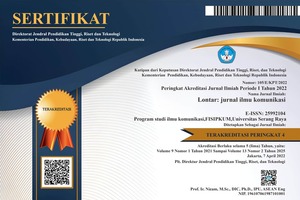Focus and Scope
LONTAR: Jurnal Ilmu Komunikasi is an open-access, peer-reviewed journal that serves as a platform for disseminating research and scholarship in the field of Communication Studies. We welcome contributions from various disciplines and approaches that intersect with communication, fostering an interdisciplinary dialogue.
LONTAR: Jurnal Ilmu Komunikasi is dedicated to being a medium for scientific study where scholars, practitioners, and students can communicate their vision, reflect on their experiences, share research results, and engage in critical analysis of communication issues that shape our society.
Aims:
- To provide a forum for exchanging ideas, research findings, and critical analysis in communication.
- To encourage the development of new theories, methodologies, and practices in communication studies.
- To promote the understanding of communication processes, effects, and implications in various contexts.
- To facilitate the dissemination of knowledge that contributes to advancing communication scholarship and practice.
Scope:
- Interdisciplinary Approach: LONTAR: Jurnal Ilmu Komunikasi is open to contributions from various disciplines that intersect with communication, including but not limited to sociology, psychology, anthropology, political science, media studies, cultural studies, linguistics, and information technology.
- Research-Based Articles: We publish scientific articles that are grounded in empirical research, providing insights into communication phenomena through rigorous field research.
- Thematic Focus: The journal covers a broad spectrum of communication issues, including a) Media and Society, b) Interpersonal and Organizational Communication, c) Political Communication, d) Digital and New Media, e) Cultural and Cross-Cultural Communication, f) Communication Technology and Innovation, g) Public Relations and Advertising, h: Health Communication, i) Environmental Communication, j) Communication Ethics and Policy.
- Types of Contributions: a) Original Research: Articles presenting new research findings, methodologies, or theoretical frameworks. b) Review Articles: Comprehensive reviews of literature or critical analyses of existing research in communication studies. c) Conceptual Papers: Papers that offer new conceptual insights or theoretical reflections on communication issues. d) Case Studies: In-depth analyses of specific communication events, campaigns, or phenomena. e) Field Experiences: Articles that share unique experiences or lessons learned from communication practices in the field.
- Critical Analysis: We encourage submissions that critically analyze contemporary communication issues, offering insights into the complexities of communication in today's globalized and digital world.





